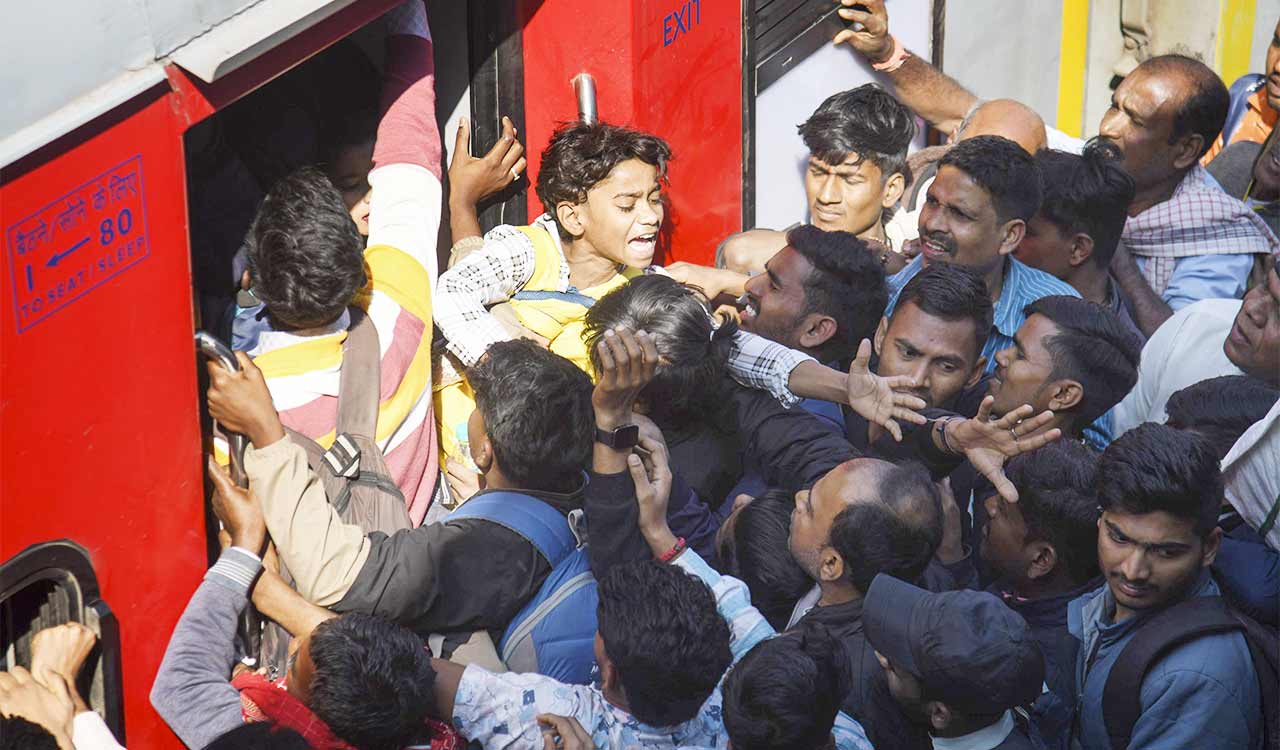Opinion: Let the next stampede not be the next story
We are witnessing the rise of a culture where being a fan is valued more than being a thinker, a questioner, or an achiever. India must move from spectacle to substance, from fandom to citizenship, from mourning to meaningful reform

By Chada Rekha Rao
A sports victory, a religious congregation, a film premiere, or a political appearance — each has increasingly become a site of a tomb. Time and again, what begins as a celebration ends in tragedy, often in the form of a stampede.
Also Read
The response is tragically familiar: political leaders arrive, condolences are issued, compensation is announced and headlines move on. Meanwhile, lives — mostly those of the poor and the voiceless — are lost in the name of devotion, welfare, or fandom.
A Nation in Celebration, A Society in Peril
India’s public events today often resemble spectacles — grand in scale, fervent in tone, and deeply personalised. These are not forums for civic engagement, but rather arenas of mass adulation centred around a figurehead —be it a film star, a political leader, or a spiritual guru.
In the process, the citizen becomes a passive observer, a number in a crowd, rather than an active participant in a democratic or cultural discourse. We are witnessing the rise of a culture where being a fan is valued more than being a thinker, a questioner, or an achiever.
When Welfare Turns Fatal
What is perhaps most disheartening is that these tragedies disproportionately impact the underprivileged — the elderly, the ill, the economically vulnerable. Those who gather not for entertainment but for essentials: a free health check-up, a ration kit, or a welfare token.
If celebration entails risk to life, it ceases to be a celebration — it becomes institutionalised negligence. And no compensation, no apology, can restore what is lost
A government scheme, meant to provide relief, should not become a matter of life and death. Yet in 2025, across several States, the scenes repeat: people crushed in crowds, security systems overwhelmed, and administration scrambling in the aftermath.
Governance has become performance, and the citizen, collateral damage.
Compensation Without Accountability
Post-tragedy responses have become disturbingly predictable. Financial compensation — Rs 5 lakh for the deceased, Rs 2 lakh for the injured — is declared. Ministers visit hospitals. Committees are formed. And then, inertia resumes.
Rarely are fundamental questions addressed: Why was crowd control inadequate? Why was the venue not equipped with real-time surveillance? Why was the turnout not monitored digitally, despite India’s technological strides?
It is a failure not just of infrastructure but of priorities.
Digital India — But for Whom?
India takes pride in being a digital powerhouse, with its ambitions in AI, 5G, and governance dashboards. Yet, basic crowd analytics are missing at most public gatherings. Can we not deploy drones for real-time heat maps of crowds? Can we not enforce geofencing around venues to regulate entry? Can we not mandate digital registration for high-footfall events?
The answer is: we can. But we don’t. Because crowd management does not translate into political mileage — crowd size does.
The Case for Virtual Public Life
During the Covid-19 pandemic, India proved it could observe events without gathering in dangerous numbers. Devotional programmes were televised. Government updates went digital. The public adapted.
Why then must every announcement, scheme, or felicitation take the form of a mass congregation?
There is a compelling case for livestreaming key events, using community screens in villages and urban settlements. Major launches and political addresses can be experienced digitally — without endangering human life.
There is also a cultural concern. Today’s youth are more familiar with influencers and film celebrities than with scientists, educators, or reformers. Social media feeds are curated for glamour, not merit. In many schools, obedience is rewarded over curiosity.
We are cultivating fans, not future leaders.
What Must Change
India must now rethink how it engages its people. The following steps are urgent:
- Mandatory digital registration for large gatherings, with controlled entry.
- Strict crowd caps, monitored via AI and supported by on-site emergency response teams.
- Legal accountability for organisers of unsafe events — irrespective of political or religious affiliations.
- Ban on mass giveaways unless staggered via mobile app-based slotting.
- Priority to digital outreach, especially for welfare schemes and public health initiatives.
These are not aspirational goals; they are administrative imperatives.
Reframing What We Celebrate
Why are there no stampedes to hear a Nobel laureate speak? Why does the launch of a rural innovation fail to trend online? The answer lies in what we choose to applaud.
Adulation has taken precedence over contribution.
It is time we re-centre our value system around excellence, not just popularity. Children should aspire to create, not merely consume; to lead, not just follow.
Let us not wait for another stampede to initiate reform. Let us not measure the success of an event by the size of its crowd, but by the safety and dignity of its participants.
If celebration entails risk to life, it ceases to be a celebration — it becomes institutionalised negligence. And no compensation, no apology, can restore what is lost.
India must move from spectacle to substance, from fandom to citizenship, from mourning to meaningful reform.
Let the next stampede not be the next story. Let it be the last.

(The author is an Educationist)
Related News
-
Is it a crime to win majority of wards, Suman asks Vivek before arrest
9 mins ago -
Deer killed in road accident in Kothagudem
21 mins ago -
Speaker concludes hearing on disqualification petition against Danam Nagender
45 mins ago -
Consumers’ body wants BIS Standards Clubs set up in schools, colleges in Telangana
47 mins ago -
Telangana’s finances struggle over weak revenues and mounting debts
50 mins ago -
IIT Hyderabad to host MSME Tech Connect 2026
52 mins ago -
Khammam, Warangal police excel in Telangana Police Sports and Games Meet
1 hour ago -
GHMC launches MyCURE app for faster civic grievance redressal
1 hour ago




